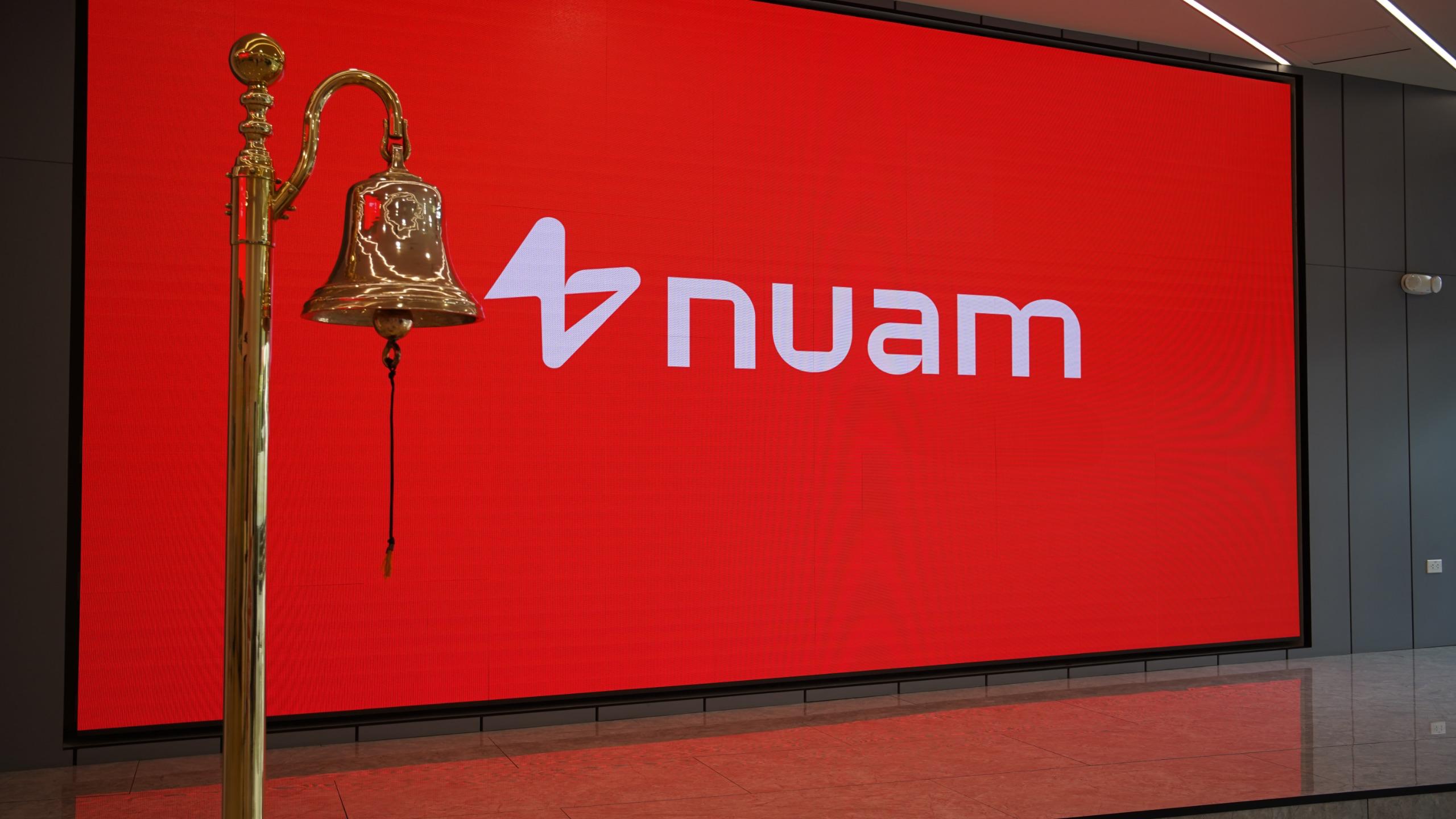'Market integration is not a whim of some stock exchanges, it is a positive development for our countries': Juan Pablo Córdoba, manager of nuam

Two years after taking over as CEO of nuam, the holding company that brings together the stock exchanges of Santiago (Chile), Lima (Peru), and Colombia, Juan Pablo Córdoba Garcés is convinced that this integration, as well as that of the capital markets of those three nations, is the right path that will allow this bloc to boost its economic development.
It is not an easy task and requires the joint work and effort of all economic stakeholders in these countries, as he told EL TIEMPO in an interview during his visit to Colombia, where he participated last week in the 15th nuam - Asobolsa Regional Congress in Cartagena, in which he made it clear that "beyond a whim of the stock markets, this is a positive development that will have a very positive impact on the countries."
You participated in the last Asobolsa-nuam Congress in Cartagena. What messages did that meeting leave for Colombia and Latin America? There are several. First, I believe there is consensus, not only in Colombia but in all countries in the region, that Latin America must return to the path of growth. It's the only way to lift people out of poverty, generate social cohesion, and well-being. Growth at 2 percent isn't enough; we have to return to levels of 4 percent; that's very important.
Another element that I believe is very compelling is that a lever for economic growth is the development of the financial system and capital markets, which must be dynamic, strong, and powerful; one that accompanies, leverages, and finances that economic growth, which is achieved, in turn, through investment. But, in addition, that investment requires legal certainty, macroeconomic stability, and financing, and this is achieved in the capital markets. There is broad consensus on these elements in the region, and this was more than ratified at that congress.

Presidential candidates discussed how they would boost the economy at the Asobolsa congress. Photo: Asobolsa
This isn't a matter of this year or the next. We are building a capital market for the region for the next 50 years that will finance economic growth, and we are building it. Investment and investment financing have been negatively affected by adverse public policies we have adopted in our countries, with very poor economic results and investment flows in the last decade, particularly in recent years. For example, withdrawals of resources from pension funds, as happened in Peru and Chile, deteriorated the capital market and caused the savings rate to fall. These types of policies must be reversed.
In Colombia, there is uncertainty regarding the management of the public component of pension savings that would have to be accumulated if the reform is declared enforceable. Therefore, the management of pension savings is extremely important, and the use of those savings is key. What I'm saying is that it's not just about attracting foreign investment; it's about doing things right domestically as well. We must invite foreigners to a good party in Latin America, where investment, serious projects, and a long-term vision will be important; where growth will lift its people out of poverty and generate well-being, but because we believe in that and we cannot implement public policies that run counter to that. Therefore, I believe that a public policy path that provides security, confidence, and attracts national and international investment will be important.
You mention trust as a key factor. How can we restore not only the trust of foreign investors but also that of consumers in the Colombian case? I think it's relatively easy. The point is, you have to be clear about what needs to be done, and you have to say it with conviction and force. As I said, there have been many policy mistakes that, being self-inflicted, can be reversed, and by doing so, with a clear, forceful, and credible message, you can regain a lot of trust. Something that generates a lot of trust is the consistency of policies over time. If I say something, commit to it, and follow through, that begins to generate trust. I think it's a matter of starting to send the right messages and being consistent and coherent in their implementation.
How long will it take Colombia to recover the ground it has lost on that front? The message here is the same for all of Latin America. Given the current state of the world, the region has a golden opportunity. It's the continent with the greatest tradition of transnational peace, and from a sustainability and environmental perspective, we have all the elements needed for the energy transition and geopolitically. If we do things right, we can attract that investment to our region for the benefit of our people. I think the message is: let's understand our role in the world, let's do things right, and let's seize the opportunity to generate well-being for our citizens, which requires us to become an attractive region for investment.
In this transition to a state of greater confidence, is there anything that can be done to stop migration? If conditions begin to change, there will be no need to think about other horizons. But the key issue here is young people. We must build national goals in our countries so that young people can envision a happy and prosperous future in their own countries. What we cannot do is allow young people to think that their best option for the future is to leave our countries. We must build that vision, that hope that here we can do business, entrepreneurship, become academics, employees, that we can build a family and a rewarding future. We must build that; what we cannot do is create an environment of hopelessness, especially for young people.

Market integration panel highlighting its importance as a driver of growth. Photo: Asobolsa
First, far from being a whim of the stock market, this is a sentiment shared by all market participants, and this development is extremely positive because it's for our countries. At the end of the day, those who benefit from a larger, deeper capital market with more competition, greater capital flow, and more participants are the countries, because they are the ones that need investment, capital flow, and long-term financing. We need to finance entrepreneurship and risk-taking.
But, returning to the point of public policies, to build trust, I believe we have had a strategy that is proving to be useful: having a very clear long-term objective and consistency in the execution of that strategy. As we continue to implement it, people gain confidence that this is not only possible, but will be achieved, and they want to be part of it. What we need is to continue adding value, for everyone to be aligned on that goal, because this isn't something that stock markets do, nor is it the financial integration of Chile, Peru, Colombia, and hopefully many other countries in the future. We do it together.
Is the schedule being met? We're making quite good progress. Obviously, one always aspires to move things more quickly, but today we have important achievements, such as the operations manual for the equity market approved in all three countries, which will allow us to provide the markets with technology and an operating model that meets the highest international standards. This means that whether I'm in Chile, Peru, or Colombia, when I go to buy or sell a share, I'm doing exactly the same thing. It's not yet an integrated market, but it's beginning to generate this concept of harmonization.
Furthermore, the technology is currently being tested with our clients, building trust because it's very important that everyone feels comfortable making an operating system change because the idea is to put that into production hopefully before the end of this year. Next year we will do the same with the clearing and settlement of operations with the same technology, which will allow us to give people who are operating in the markets peace of mind and improve the standard of operation.

Nuam began its implementation and integration in 2024-2025, although its legal creation was in 2023. Photo: BVC
Of course, the point is that the equity market infrastructure is more comprehensive, so other markets can be added little by little. So, once we have the entire infrastructure in place for the equity market, the truth is that the market will tell us which product makes sense, when, and which one is next, but the infrastructure and the entire regulatory framework will already be in place.
The Colombian stock market is going through a good period. What is needed for this growth to be sustainable over time? We can't have a country strategy based on luck. We have to build the future of our countries with effort, so we must have a long-term vision, knowing where we want to go and what future we want to create for our population, for our young people, so that we can successfully achieve our goals in our countries. There will undoubtedly be good and bad times along this 25, 30, and 50-year path; the important thing is that the path and direction are correct. And in situations like the current one, there is an enormous opportunity for Latin America that it must know how to take advantage of. The world is attentive to better investment opportunities with legal security, with geographic, political, and economic diversification; we have much to offer the world, but we have to offer it well, in a credible, consistent manner, and respecting the rules of the game. If the region does well in the current situation, we can take advantage of the circumstances and understand that this can accelerate the long-term process we need.
What else does this equation need to move forward with the forcefulness the country requires? In our countries, we need much more of everything. We need a greater appetite for risk through institutional channels, and regulation and supervision that also encourage risk-taking. An economy doesn't grow if it doesn't invest and take risks. We've been created with a culture that risk-taking is bad, and what we see around the world is that entrepreneurship is the way new businesses are generated. The United States economy is the most dynamic in the world because it takes risks, because it undertakes, because it finances crazy ideas. Sometimes regulation and supervision prevent us from taking risks through formal channels, so we need many more entrepreneurial companies, hopefully young entrepreneurs who want to undertake them. But we also need capital to accompany this process, because entrepreneurship requires capital. It doesn't require credit, it requires capital from investors, and this requires a variety of alternatives to take those risks. The capital market is the vehicle that makes this viable, because it is designed to allocate risks well in an economy, to finance things that are not financeable through the banking system.
Finally, how can we bring this integration project closer to people when, for example, in a market like ours, those same people still can't connect to the desired extent? First, people should learn to invest by investing. Of course, they need financial education, but they need to overcome their fear of it. The great thing about today is that through mobile apps, I can invest as little as 50,000 pesos. While I don't want to lose my money, I can explore and learn by investing small amounts. I gain confidence to then invest a little more. Another important message is that financial inclusion isn't just about opening a bank account; it's precisely about having access to investment products. With integration, what we're going to do is provide even more investment opportunities for these people.
Now, why is integration important? Because by expanding the market, it makes it more viable for participants to invest in technology, services, consulting, and distribution, so that more information reaches small investors and they have more opportunities. That's why we are committed to working tirelessly and with a very clear focus to achieve this integration for our countries.
eltiempo




